After 'high-risk' cancer diagnosis, owners of Springfield marketing agency get good news
A fez perched carefully atop his head, Gabriel Cassady held out three small pieces of fabric: one red, one blue, one white.
"There are lot of misnomers and things about the American flag ... but if you look it up, it's really quite mysterious, to the point where I think these colors have a little bit of magic," Cassady said, before carefully tucking the pieces of fabric into his fist. "You take them all and you mix them all in there ... I go into my pocket, get the magic wand ..."
From his closed fist, Cassady pulled out not the three pieces of different-colored fabric, but one long piece of fabric bearing the American flag.
For 36-year-old Cassady, rediscovering magic tricks, a hobby integral throughout his childhood, has been important the past few months.
In October, Cassady, who is the co-owner of 2oddballs Creative with his wife, Kylie Cassady, was diagnosed with embryonal rhabdomyosarcoma, a rare type of sarcoma cancer that usually affects children under the age of 5. But after months of testing, a few rounds of chemotherapy and surgery, Cassady is hoping for a cancer-free future.
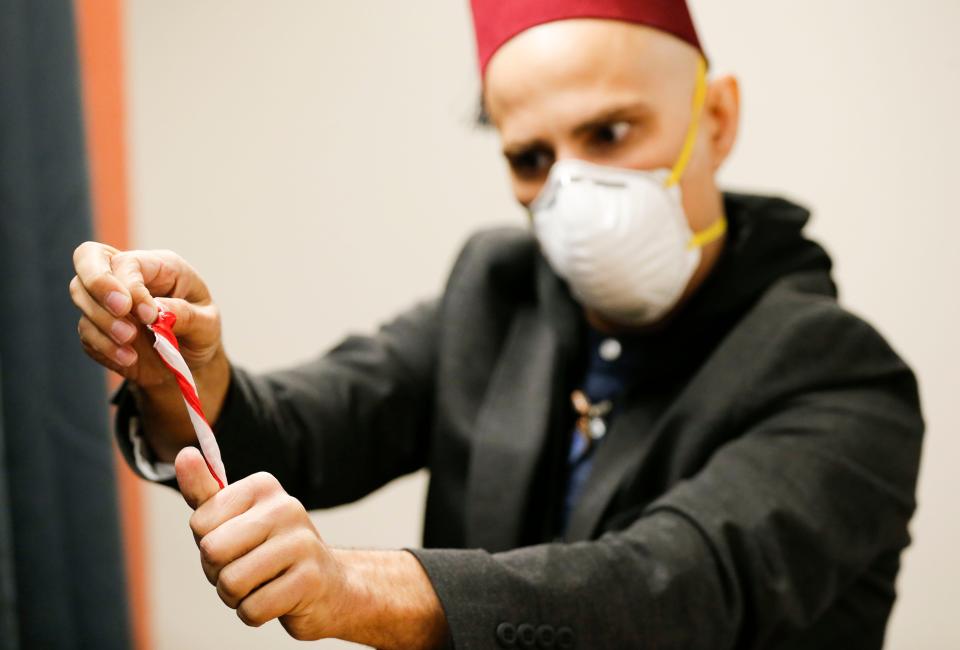
Sarcomas, which are less than 1% of cancers diagnosed each year, develop in the body's connective tissue, such as muscles, fat, bones, lining of joints or blood vessels. Rhabdomyosarcoma is a specific type of sarcoma that usually develops in skeletal muscles, which control how the body moves. Embryonal rhabdomyosarcoma is one of two main types of rhabdomyosarcoma. According to the American Cancer Society, embryonal rhabdomyosarcoma tends to occur in the head and neck, bladder, vagina or in and around the prostate and testicles.
To put the rarity into context, Cassady said his sarcoma specialist at The University of Kansas Cancer Center told him that he found only one other man — around Cassady's age — who was diagnosed with embryonal rhabdomyosarcoma in early 2023. He lives in Kuwait.
As embryonal rhabdomyosarcoma is usually found in children, the cancer is typically faster-growing in adults and can be harder to treat, according to the American Cancer Society. Fortunately, Cassady is on the road to recovery.
The News-Leader initially spoke with the Cassadys in their 2oddballs office on Thursday, Nov. 30, about Gabriel's journey. Following a surgery Gabriel underwent on Dec. 8, the News-Leader spoke with the couple Wednesday, Dec. 13, to follow up.
Receiving the diagnosis, undergoing chemotherapy
Cassady's diagnosis came suddenly and without warning to the couple. But the process of obtaining a diagnosis and treatment plan felt painstakingly long.
In late July, Cassady visited the emergency room because he had not urinated in two days. For the previous week or so, Cassady was having issues with urinating regularly, but "like most men, I didn't want to talk about my bathroom issues," he said.
At the emergency room, staff placed a catheter and Cassady underwent a CT scan, which showed a 5- to 6-centimeter mass on his prostate.
"They said mass. I said, 'Catholic or black?' No one laughed," Cassady said.
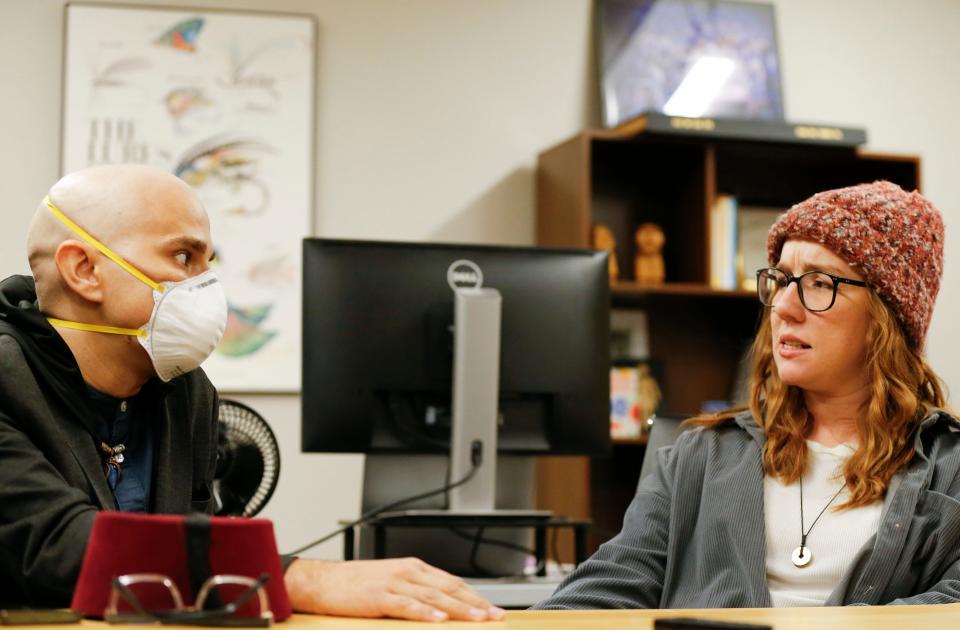
An emergency room doctor recommended the Cassadys visit a urologist, a doctor who specializes in diagnosing and treating diseases in the urinary system. He told the couple that the mass found on Gabriel's prostate was likely cancer.
It was two months before the Cassadys got the answers they were looking for. All the while, Gabriel relied on a catheter.
By the time the Cassadys learned that the mass on Gabriel's prostate was embryonal rhabdomyosarcoma, the tumor had already grown to about 7 to 8 centimeters. While the tumor is located on Cassady's prostate, he does not have prostate cancer.
"Prostate cancer is a glandular phenomenon that happens in the prostate," Cassady explained. "I have a sarcoma, which can happen anywhere in your body. It just happens to be, lucky me, on my prostate."
Unlike more common cancers, sarcoma is traditionally not put on a stage scale of one to four. Cassady said his doctors instead explained that embryonal rhabdomyosarcoma is a "high risk" cancer, especially in adults, and required fast action.
With the intention of shrinking the tumor in size and preventing metastasis — when cancer spreads to different parts of the body from where it started — Cassady started chemotherapy treatment "immediately."
"They put my port in the same morning that they started treatment," he said. A chemo port is a small, implantable device that attaches to a vein, usually in the upper chest area, allowing blood draws and treatments without a needle stick, according to the Cleveland Clinic.
When Cassady spoke with the News-Leader on Nov. 30, he was preparing to enter his fourth "cycle," a period of chemo treatment followed by a period of rest. Initially, Cassady was to complete 14 cycles, with one cycle being two weeks.
For Cassady, a cycle started with a vincristine, doxorubicin, cyclophosphamide — or VDC — treatment, which lasted between five to six hours. Cassady traveled to the University of Kansas for his treatments. Then, Cassady had a 24-hour rest period before receiving a white blood cell infusion, which was to help boost the number of white blood cells in his body. For the remainder of that first week, Cassady said he usually felt "pretty awful," with low energy. By the second week, which was dedicated to rest and recovery, he began to feel more like himself.
One of the most difficult adjustments to navigate during his treatment was losing hair.
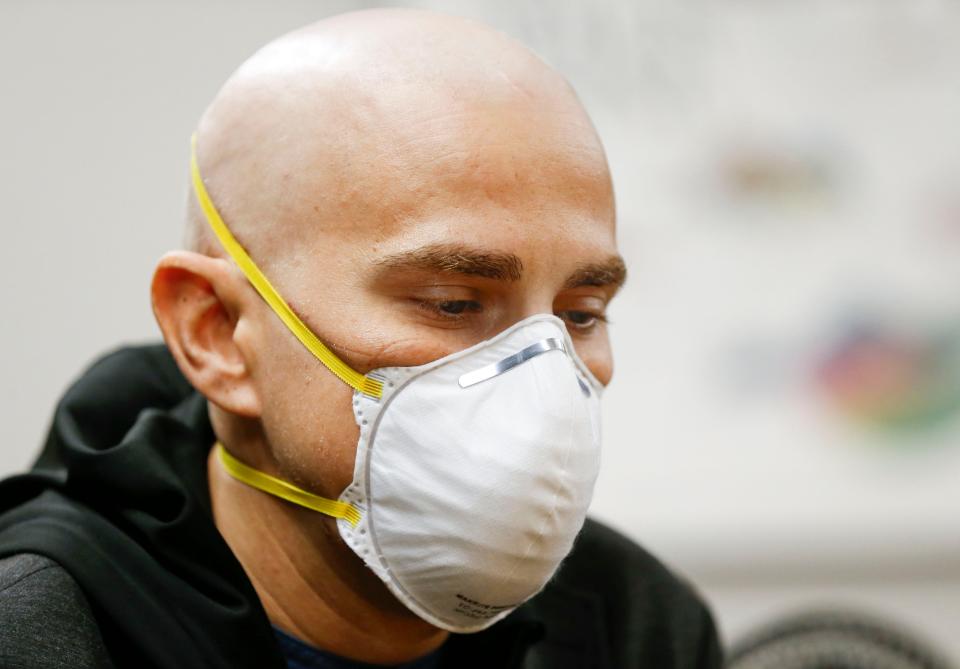
"He was looking up different information, like, 'Should I shave my head? Should I not?' A lot of the articles online were like, 'It's up to you.' But there was no practical advice," Kylie said. "When his hair started falling out, he was already nauseous and it was like falling into food. I mean, it was just everywhere. And not that I minded, but I think it would have been helpful for somebody to read, 'Hey, shave your head.'"
Looking toward a cancer-free future
On Monday, Dec. 4, the Cassadys drove to the University of Kansas for Gabriel to start his fourth round of chemo, but plans changed dramatically. For the two weeks since his last treatment, Cassady felt as if his symptoms — having issues urinating — were not improving. Upon arriving at the hospital, the couple requested another CT scan before Gabriel started chemo and the doctors obliged. The CT scan showed that Cassady's tumor had grown, with the largest portion at about 9.3 centimeters.
"At that point, they said, 'We're going to get you a room at the main hospital, so they can get the ball rolling on surgery,'" Kylie told the News-Leader by phone.
What surgery looked like, at that point, was still up in the air, but the doctor told the Cassadys that there was an "85% chance" that Gabriel's bladder would need to be removed completely. If the bladder were to be removed, a urostomy bag or neobladder were possible outcomes. A neobladder is made from a reconstructed piece of the small intestine.
The University of Kansas Hospital was able to get Gabriel in for surgery that Friday, Dec. 8.
"He told me how to approach him after the surgery," Kylie said with a laugh. "He said, 'If you come in and I still have my bladder, lead with that. Say, 'You have your bladder!' If you come in and they say I have a neobladder, then say, 'You have a new bladder!' But if they come in and neither were (successful), say, 'You're alive!'"
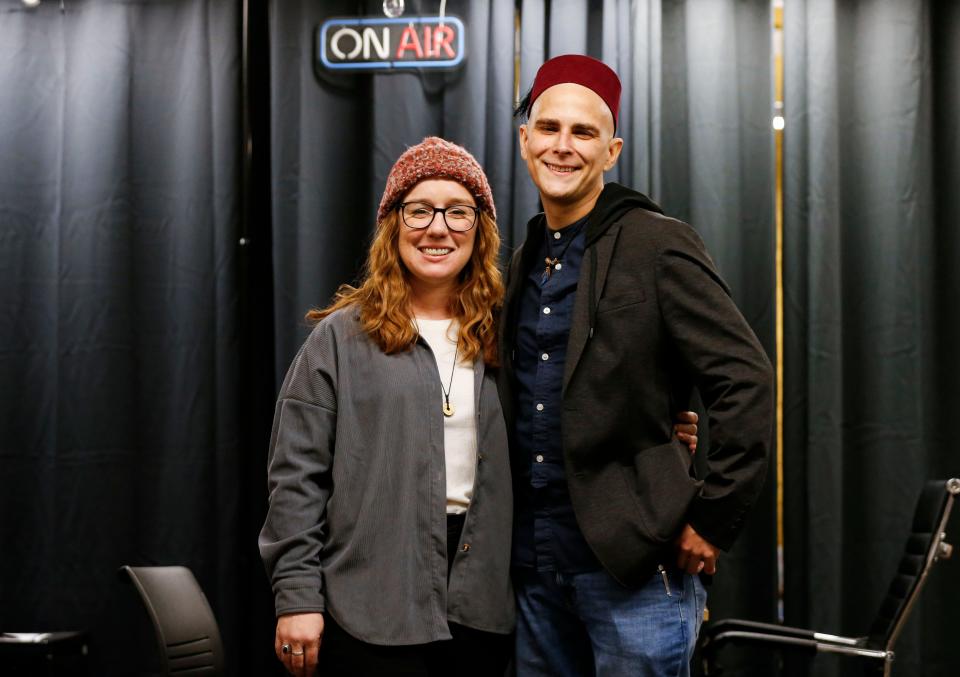
To the Cassadys' surprise, neither a urostomy bag or neobladder were necessary. During a six-and-a-half hour surgery, Gabriel's prostate and seminal vesicles were removed, along with a small piece of his bladder with minor re-stitching, but for the most part, Cassady's bladder is able to function as normal.
"When I finally first got to see him and he rolled in, he's like half asleep but he has his fists in the air in celebration. And the first thing he says is, 'They saved my bladder," Kylie said. "He was so sweet."
The Cassadys go in for their first post-surgery appointment with an oncologist on Tuesday for an updated PET scan to determine what next steps look like. However, the doctor told the couple that he is "confident" that all of the cancer was removed during the surgery.
Assuming all is well, Cassady will spend the next six or so weeks recovering without extensive physical activity before returning to life as normal.
Despite the good news so far, Kylie said it feels too soon to celebrate.
"It feels very hopeful but at the same time, it's hard for me to celebrate just yet until we talk to people next week just because we haven't really gotten any direction besides, 'Hey, we got this out,'" she said. "We're like, 'Okay, what does this mean?'"
"It's hard to celebrate when you can't laugh," Cassady added, stating on the call with the News-Leader that due to his incision from the surgery, talking for long periods of time and laughing can be painful right now.
Remaining optimistic
Despite the hardships over the past few months, the Cassadys have tried their best to remain in high spirits.
One of the ways Gabriel Cassady has tried to keep himself occupied is by learning new magic tricks or expanding on ones he hasn't touched since he was a kid. When speaking with the News-Leader after his surgery, Cassady said he has been in contact with CoxHealth to schedule a few "hospital tours" in January, conducting magic tricks for children in their care.
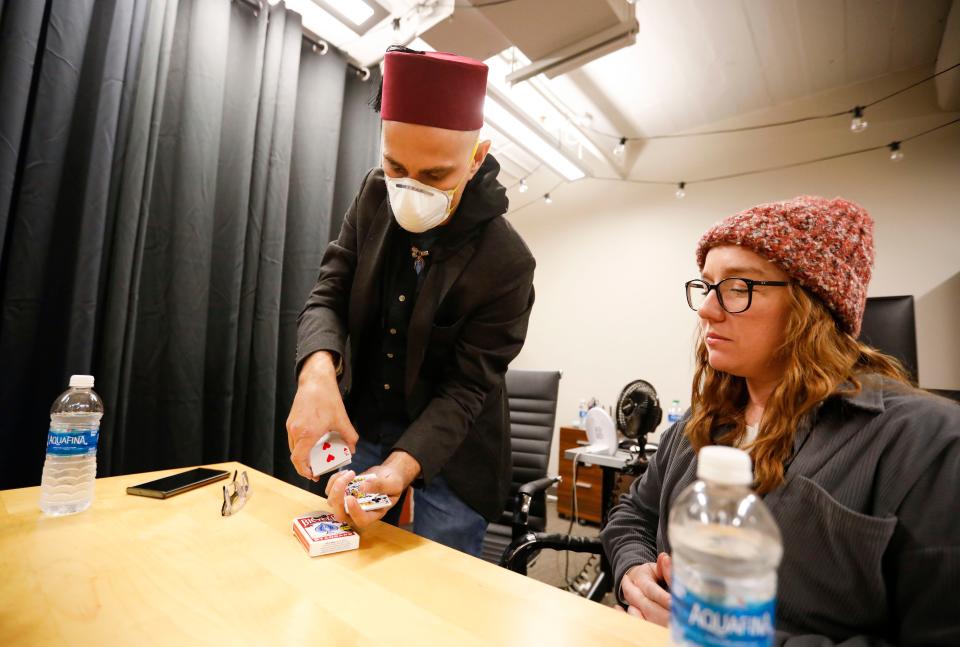
Perhaps more than anything, recent weeks have been a time of reflection.
"You immediately realize, there's this notion of mortality salience and now, all of a sudden, my mortality became super salient," Cassady said. "I had this perspective shift of what's important. You can have the exercise, 'Well, what if I were dead tomorrow? What would I wish I'd done today?' Well, when death is facing you that close, it's not an exercise. So you say, 'What have I not done and what do I do?' And fortunately, there's not a lot I haven't done. We've done a lot together. The main thing that I focus on right now is bringing joy into the world and spending time with friends and family."
What is the future of 2oddballs?
Gabriel and Kylie founded 2oddballs Creative in 2016. The couple and business duo don't have any plans of leaving the marketing business. While Gabriel will remain involved with consulting when necessary, Kylie is taking over the lead role, managing the majority of the business' day-to-day tasks.
Greta Cross is the trending topics reporter for the Springfield News-Leader. Follow her on X and Instagram @gretacrossphoto. Story idea? Email her at gcross@gannett.com.
This article originally appeared on Springfield News-Leader: 2oddballs co-owner navigates life after 'high-risk' cancer diagnosis

